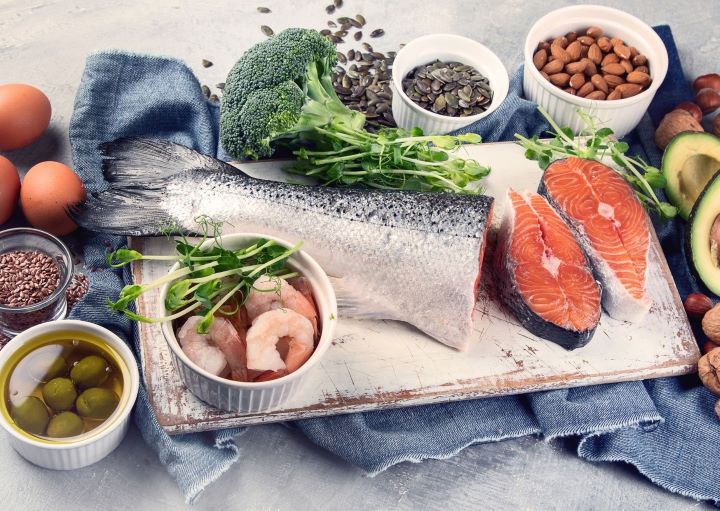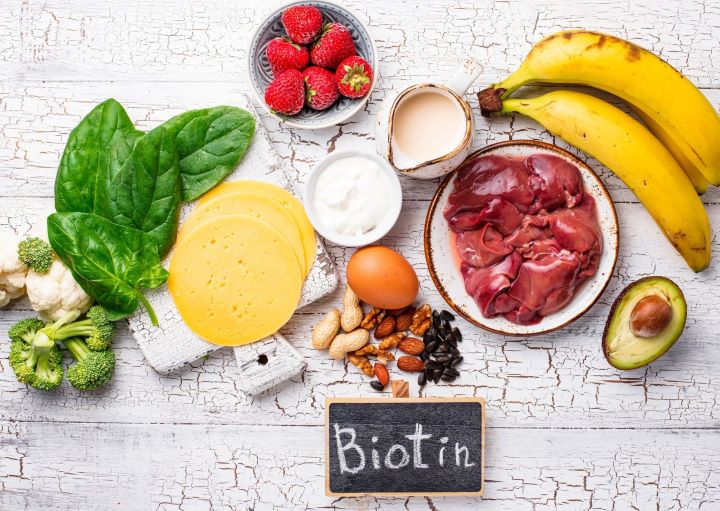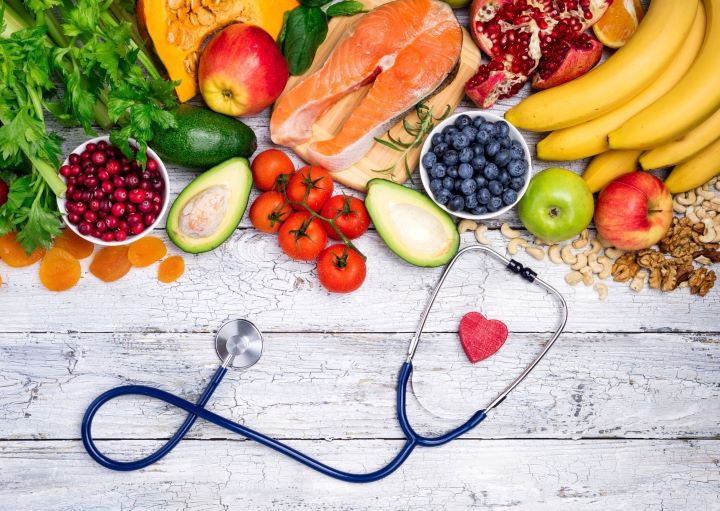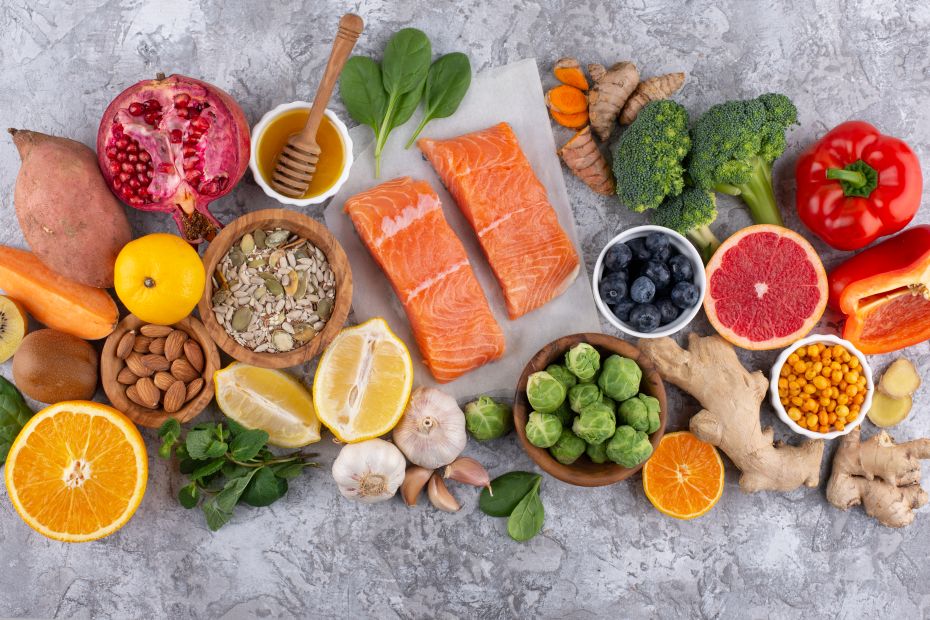Vitamins are a group of substances that are responsible for normal cell function, growth, and development. 13 Types of Vitamins perform various functions to help keep the body working properly, some vitamins resist infections and keep your nerves healthy; while others may help you get enough energy from food or help your blood clot properly.
By following a diet plan, you will get enough of these vitamins from your food. Vitamins are mainly categorized into two:
Fat-soluble vitamins
They are stored in the body’s fatty tissues. These vitamins are absorbed more easily by the body due to the presence of dietary fat. Fat-soluble vitamins are stored in the body’s cells and are not excreted as easily as water-soluble vitamins.
They do not need to be consumed as often as water-soluble vitamins, although an adequate amount of them is needed. If you take more amounts of fat-soluble vitamins, it could become toxic. A balanced diet usually provides enough fat-soluble vitamins.
Water soluble vitamins
There are nine water-soluble vitamins that are not stored in the body. Water-soluble vitamins travel freely through the body and the leftover water-soluble vitamins leave the body in the form of urine. Although our body has to consume these vitamins on a regular basis to prevent their shortage in the body.
Vitamin B12 is the only water-soluble vitamin that can be stored in the liver for up to a few years. The body needs water-soluble vitamins in frequent but small doses.

These vitamins are not like fat-soluble vitamins to reach toxic levels. Each of the vitamins listed below has an important job in the human body. A vitamin deficiency occurs when you do not consume enough of a certain vitamin. Let’s learn more about vitamins and their benefits to the human body.
Vitamin A

It helps form and maintains healthy teeth, bones, soft tissues, mucous membranes, and skin.
SOURCE:
Animal sources (retinol):
- fortified milk
- cheese
- cream
- butter
- fortified margarine
- eggs
- liver
Plant sources (Beta-carotene):
- Leafy, dark green vegetables
- dark orange fruits (apricots, musk melon)
- vegetables (carrots, winter squash, sweet potatoes, pumpkin)
1 of 13 Types Of Vitamins
Vitamin B1 (Thiamine)

It helps the body cells change carbs into energy. Getting enough of the right amount of carbs is very important during pregnancy and breastfeeding. It is also essential for a healthy functioning heart and steady nerve cells.
SOURCE:
Found in almost all nutritious food items in moderate amounts:
- Pork
- whole-grain foods
- enriched bread
- cereals
- legumes
- nuts
- seeds
2 of 13 Types Of Vitamins
Vitamin B2 (Riboflavin)

It works with the other B vitamins. It is essential for body growth and for the production of red blood cells.
SOURCE:
- Milk and milk products
- leafy green vegetables
- whole-grain foods
- enriched bread
- cereals
3 of 13 Types Of Vitamins
Vitamin B3 (Niacin)

It is a B vitamin that helps in maintaining healthy skin and nerves. It is well known for its cholesterol-lowering effects at quite high doses.
SOURCE:
- Meat
- poultry
- fish
- whole-grain foods
- enriched bread
- Cereals
- mushrooms
- asparagus
- leafy green vegetables
- peanut butter
4 of 13 Types Of Vitamins
Vitamin B6 (Pyridoxine)

It helps to increase red blood cells and maintain brain function. This vitamin also plays an important role in proteins which is a part of many chemical reactions in the body. The more protein you consume the more pyridoxine your body requires.
SOURCE:
- Meat
- fish
- poultry
- vegetables
- fruits
5 of 13 Types Of Vitamins
Vitamin B9 (Folic Acid)

It works with vitamin B12 and forms red blood cells. It is involved in the production of DNA, which controls tissue growth and cell function. Pregnant women should be sure to get enough folate/folic acid. Low levels of folate are linked to various birth defects. Many foods are now linked with folic acid.
SOURCE:
- Leafy green vegetables
- legumes
- seeds
- orange juice
- liver
- refined grains
6 of 13 Types Of Vitamins
Vitamin B12 (Cobalamine)

Like every other B vitamin, it is essential for metabolism. It also helps in the formation of red blood cells and maintains the central nervous system.
SOURCE:
It is not found in plant foods, whereas:
- Meat
- poultry
- fish
- seafood
- eggs
- milk and milk products
7 of 13 Types Of Vitamins
Vitamin C (Ascorbic Acid)

It is an antioxidant that promotes healthy teeth and gums. It helps the body to absorb iron and to maintain healthy tissues. It is also essential for wound healing.
SOURCE:
- citrus fruits
- vegetables in the cabbage family
- Musk melon
- strawberries
- peppers
- tomatoes
- potatoes
- lettuce
- papayas
- mangoes
- kiwifruit
8 of 13 Types Of Vitamins
Vitamin D

It is also known as the “sunshine vitamin,” since it is made by the body after exposure to the sun. Ten to fifteen minutes of exposure 3 times a week is enough to produce the body’s requirement of vitamin D for most people at most latitudes. People who do not live in sunny places may not get enough vitamin D.
It is very hard to get enough vitamin D from only food sources. Vitamin D helps the body to absorb calcium. You need calcium for the development and maintenance of healthy teeth and bones normally. It also helps to maintain proper blood levels of calcium and phosphorus.
SOURCE:
- Egg yolks
- liver
- fatty fish
- fortified milk
- Fortified margarine
9 of 13 Types Of Vitamins
Vitamin E

It is an antioxidant that is also known as tocopherol. It helps the body to form red blood cells and use vitamin K effectively.
SOURCE:
- Polyunsaturated plant oils (soybean, corn, cottonseed, safflower)
- leafy green vegetables
- wheat germ
- whole-grain products
- liver
- egg yolks
- nuts
- seeds
10 of 13 Types Of Vitamins
Vitamin K

It is important because blood would not stick together (coagulate) without it. Some studies suggest that it is important for bone health too
SOURCE:
- kale
- collard greens
- Spinach
- broccoli
- Brussels sprouts
- asparagus
It is also produced in the intestinal tract by the bacteria present.
11 of 13 Types Of Vitamins
Pantothenic Acid

It is essential for the metabolism process taking place in our body. It also plays a major role in the production of hormones and controlling cholesterol.
SOURCE:
Widespread in various foods.
12 of 13 Types Of Vitamins
Biotin

It is responsible for the metabolism of proteins and carbs and for the production of hormones and cholesterol.
SOURCE:
Widespread in various foods and is also produced in the intestinal tract by bacteria.
13 of 13 Types Of Vitamins
The Bottom-line
NOW, knowing the 13 essential vitamins and what food contains them, the best way to get all the vital micronutrients every day is by eating a nutrient-dense diet. A diet that includes all the sufficient and varied types of fruits, vegetables, whole grains, healthy fats, and protein will be ideal.
However, not everyone eats a healthful diet.
So many people take dozens of different supplements every day to make up for their vitamin deficiencies. While the nutrient-dense diet can be good insurance, challenge yourself to have an excellent diet. Incorporate this into your regime and eliminate unnecessary supplements.

Lastly, one should take foods that are high in vitamins because they cannot be directly produced in the body and their deficiency could lead to a number of diseases and ailments which is a threat to each and every individual out there.
The most popular question we came across, Does Weight loss requires more workouts and a strict diet?
Hold on! Let me tell you It’s easier than you think.
Yeah, you heard it Right!
Click Here to know more about how to Weightloss or Gain Weight.

Pingback: 6 Natural Ways To Increase Your Testosterone - Blogs- VMax Fitness
Pingback: 7 Best Ways To Cure Joint Pain - Blogs- VMax Fitness
Pingback: 5 Simple Antioxidants Foods Which You Need To Add To Your Diet - Blogs- VMax Fitness
Pingback: 13 Easy Healthy Snacks To Make At Home For Weight Loss - Blogs- VMax Fitness